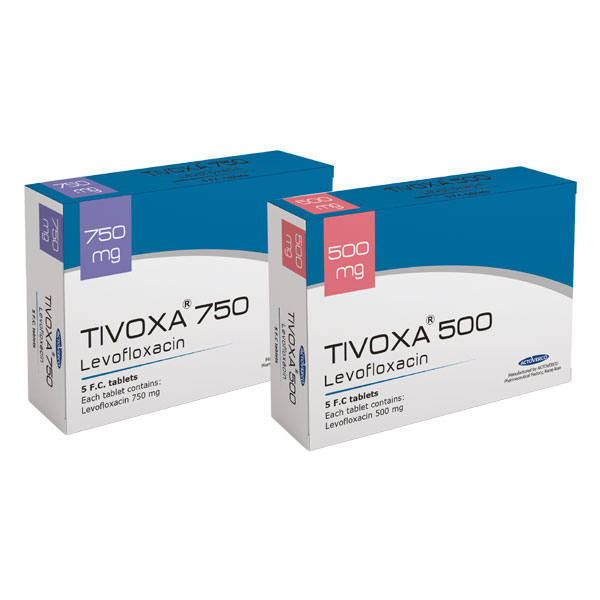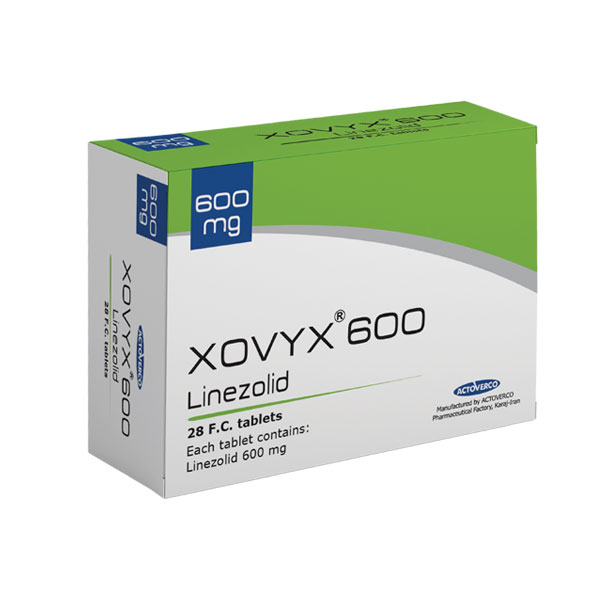Tivoxa (levoflaxcin)
Category: Antibiotic
Product Description:
Tivoxa is brand name of drug called Levoflaxacin and manufactured by Actoverco pharmaceutical factory.
Tivoxa (levofloxacin) is an antibiotic belongs to a group of drugs called oxazolidinone. This group of medicines is used to treat bacterial infections.
Product Introduction
Category: Antibiotic drugs
Dosage form:
Tablets 500,750 mg
What is Tivoxa (levoflaxcin) used for?
- It is used to treat bacterial infections.
Important notes before taking Tivoxa (levoflaxcin):
- It is used to treat bacterial infections.
What do I need to tell my doctor BEFORE I take this drug?
- If you are allergic to this drug; any part of this drug; or any other drugs, foods, or substances. Tell your doctor about the allergy and what signs you had.
- If you have any of these health problems: Long QT on ECG, low magnesium levels, or low potassium levels.
- If you have ever had any of these health problems: Nerve problems or tendon problems.
- If you have had tendons get irritated or torn when taking this drug or an alike drug in the past.
- If you have an aortic aneurysm (ballooning or bulging of the aorta, the main blood vessel that comes out of the heart) or you are at risk for this health problem. This includes if you have other blood vessel problems, high blood pressure, or certain health problems like Marfan syndrome or Ehlers-Danlos syndrome.
- If you are taking any drugs that can cause a certain type of heartbeat that is not normal (prolonged QT interval). There are many drugs that can do this. Ask your doctor or pharmacist if you are not sure.
- If you are breast-feeding. You may need to avoid breast-feeding for some time after getting this drug.
This is not a list of all drugs or health problems that interact with this drug.
Tell your doctor and pharmacist about all of your drugs (prescription or OTC, natural products, vitamins) and health problems. You must check to make sure that it is safe for you to take this drug with all of your drugs and health problems. Do not start, stop, or change the dose of any drug without checking with your doctor.
Important notes while taking Tivoxa (levoflaxcin):
- Tell all of your health care providers that you take this drug. This includes your doctors, nurses, pharmacists, and dentists.
- Avoid driving and doing other tasks or actions that call for you to be alert until you see how this drug affects you.
- This drug may affect certain lab tests. Tell all of your health care providers and lab workers that you take this drug.
- High and low blood sugar has happened with drugs like this one. Most of the time, low blood sugar happened in people with diabetes who were taking drugs that lower blood sugar like insulin. Very low blood sugar has led to coma and sometimes death. Check blood sugar as you have been told by the doctor.
- Tell your doctor if you have signs of high or low blood sugar like breath that smells like fruit, dizziness, fast breathing, fast heartbeat, feeling confused, feeling sleepy, feeling weak, flushing, headache, more thirsty or hungry, passing urine more often, shaking, or sweating.
- Have blood work checked as you have been told by the doctor. Talk with the doctor.
- Do not use longer than you have been told. A second infection may happen.
- You may get sunburned more easily. Avoid sun, sunlamps, and tanning beds. Use sunscreen and wear clothing and eyewear that protects you from the sun.
- Drink lots of noncaffeine liquids unless told to drink less liquid by your doctor.
- Rarely, very bad and sometimes deadly effects have happened with this drug. These include muscle or joint, kidney, liver, blood, and other problems. Talk with the doctor if you have questions.
- Call your doctor right away if you have signs of liver problems like dark urine, feeling tired, not hungry, upset stomach or stomach pain, light-colored stools, throwing up, or yellow skin or eyes.
- Call your doctor right away if you have signs of kidney problems like not able to pass urine; change in how much urine is passed; bloody, brown, or foamy urine; shortness of breath or cough; or puffy or swollen face, feet, or hands.
- A type of abnormal heartbeat (prolonged QT interval) can happen with this drug. Call your doctor right away if you have a fast heartbeat, a heartbeat that does not feel normal, or if you pass out.
- If you are over the age of 60, use this drug with care. You could have more side effects.
- If the patient is a child, use this drug with care. The risk of some joint and tendon problems may be higher in children.
- Tell your doctor if you are pregnant or plan on getting pregnant. You will need to talk about the benefits and risks of using this drug while you are pregnant.
Tivoxa (levoflaxcin) side effects:
Even though it may be rare, some people may have very bad and sometimes deadly side effects when taking a drug. Tell your doctor or get medical help right away if you have any of the following signs or symptoms that may be related to a very bad side effect:
- Signs of an allergic reaction, like rash; hives; itching; red, swollen, blistered, or peeling skin with or without fever; wheezing; tightness in the chest or throat; trouble breathing, swallowing, or talking; unusual hoarseness; or swelling of the mouth, face, lips, tongue, or throat. Rarely, some allergic reactions have been deadly.
- Chest pain or pressure.
- Shortness of breath.
- Shakiness.
- Trouble walking.
- Vaginal itching or discharge.
- White patches in mouth.
- Ringing in ears.
- Fever, chills, or sore throat; any unexplained bruising or bleeding; or feeling very tired or weak.
- Muscle pain or weakness.
- Not able to focus.
- Memory problems or loss.
- A very bad skin reaction (Stevens-Johnson syndrome/toxic epidermal necrolysis) may happen. It can cause very bad health problems that may not go away, and sometimes death. Get medical help right away if you have signs like red, swollen, blistered, or peeling skin (with or without fever); red or irritated eyes; or sores in your mouth, throat, nose, or eyes.
- Diarrhea is common with antibiotics. Rarely, a severe form called C diff–associated diarrhea (CDAD) may happen. Sometimes, this has led to a deadly bowel problem (colitis). CDAD may happen during or a few months after taking antibiotics. Call your doctor right away if you have stomach pain, cramps, or very loose, watery, or bloody stools. Check with your doctor before treating diarrhea.
- A rare but severe problem with the main blood vessel that comes out of the heart (aorta) has happened within 2 months after taking drugs like this one, especially in elderly patients. This includes tears or bursting of the aorta. This can lead to severe bleeding and even death. The cause for this effect is not known. Call your doctor right away if you have sudden pain in the stomach, chest, or back that is severe and does not go away.
What do I do if I miss a dose?
- Take a missed dose as soon as you think about it.
- If it is less than 8 hours until your next dose, skip the missed dose and go back to your normal time.
- Do not take 2 doses at the same time or extra doses.
How do I store and/or throw out this drug?
- Store at room temperature in a dry place. Do not store in a bathroom.


